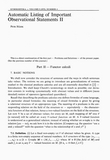Article
Full entry |
 PDF
(0.9 MB)
Feedback
PDF
(0.9 MB)
Feedback
 PDF
(0.9 MB)
Feedback
PDF
(0.9 MB)
Feedback
Related articles:
References:
[1] R. Carnap: The methodological character of theoretica concepts. In: Minnesota Studies in the Philosophy of Science, vol. I, pp. 38-76 (1956).
[2] A. Church: Introduction to mathematical logic. I. Princeton University Press 1956. MR 0010511 | Zbl 0073.24301
[3] M. Davis: Computability and unsolvability. McGraw-Hill Comp. 1958. MR 0124208 | Zbl 0080.00902
[4] Ю. В. Матиясевич: Диофантность перечислимых множеств. Доклады AH CCCP 191 (1970), 279-282. MR 0258744
[5] K. Popper: Epistemology without a knowing subject. In: Logic, Methodology and Philosophy of Science III (eds. B. van Rootselaar, J. F. Staal). North-Holland 1968. MR 0246743
[6] P. Hájek I. Havel M. Chytil: GUHA - metoda automatického vyhledávání hypotéz I. Kybernetika 2 (1966) 1, 31-47. II - ibidem 3 (1967), 5, 430-437. MR 0202606
[7] P. Hájek I. Havel M. Chytil: The GUHA method of automatic hypotheses determination. Computing 1 (1966), 293-308.
[8] P. Hájek: Problém obecného pojetí metody GUHA. Kybernetika 4 (1968), 6, 505-515.
[9] P. Hájek K. Bendová Z. Renc: The GUHA method and the three-valued logic. Kybernetika 7 (1971), 6, 421-435. MR 0324940
[10] T. Havránek: The statistical modification and interpretation of the GUHA method. Kybernetika 7 (1971), 1, 13-21. MR 0287746
[11] P. Hájek: General semantic systems and automatic listing interesting observational statements. (10 pages; distributed at the IV. Congress for Logic, Methodology and Philosophy of Science, Bucarest 1971.)
[12] P. Hájek: The GUHA method and nominal quantities. (in preparation).

